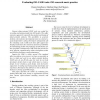Free Online Productivity Tools
i2Speak
i2Symbol
i2OCR
iTex2Img
iWeb2Print
iWeb2Shot
i2Type
iPdf2Split
iPdf2Merge
i2Bopomofo
i2Arabic
i2Style
i2Image
i2PDF
iLatex2Rtf
Sci2ools
124
click to vote
ECOOPW
1998
Springer
1998
Springer
Evaluating OO-CASE Tools: OO Research Meets Practice
Current object-oriented CASE tools are useful for recording and gaining insight into OO models. They offer extensive support for especially the analysis and design of object-oriented software. The possibility to generate skeleton code motivates development teams to construct a good design before coding. Developers subsequently add the remaining code; CASE tools then offer support for keeping model and code consistent. Extensive possibilities for maintaining models and producing documentation are also provided. Contemporary CASE tools thus provide for more efficient communication within development teams and therefore facilitate overall maintenance. Support for UML is widely spread. This standard offers a notation, not a process: no clues are provided on how to think and work in an object-oriented fashion. CASE tools do not fill this gap; the tools do not help developers decide when to take which steps to create a design. As for creating a good design, tools lack active support for rec...
CASE Tools | Contemporary CASE Tools | Distributed And Parallel Computing | ECOOPW 1998 | Object-oriented Case Tools |
| Added | 05 Aug 2010 |
| Updated | 05 Aug 2010 |
| Type | Conference |
| Year | 1998 |
| Where | ECOOPW |
| Authors | Danny Greefhorst, Mark van Elswijk, Mattijs Maat, Rob Maijers |
Comments (0)

